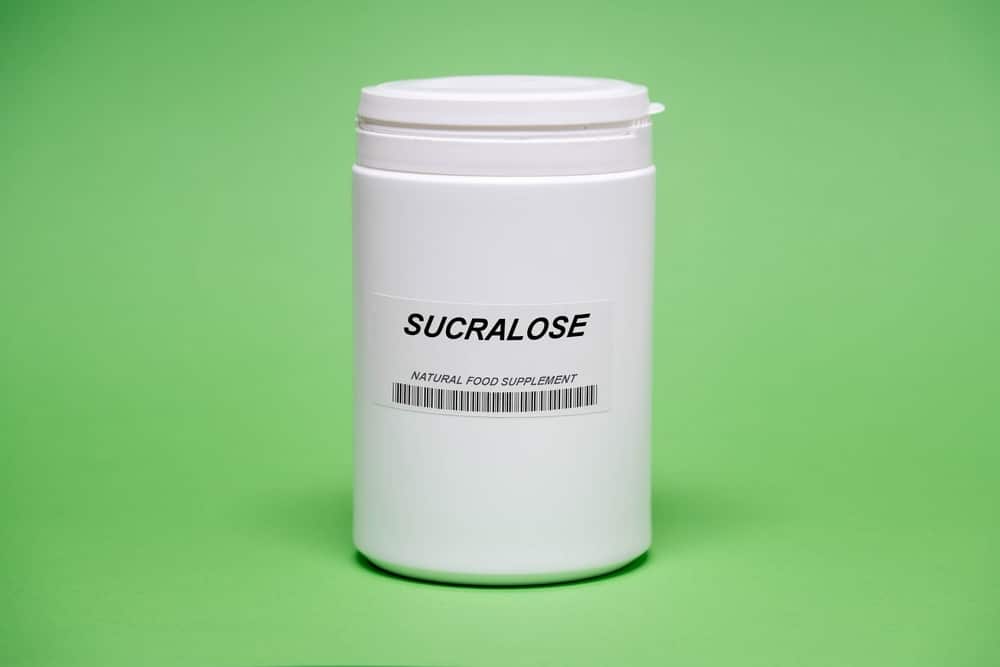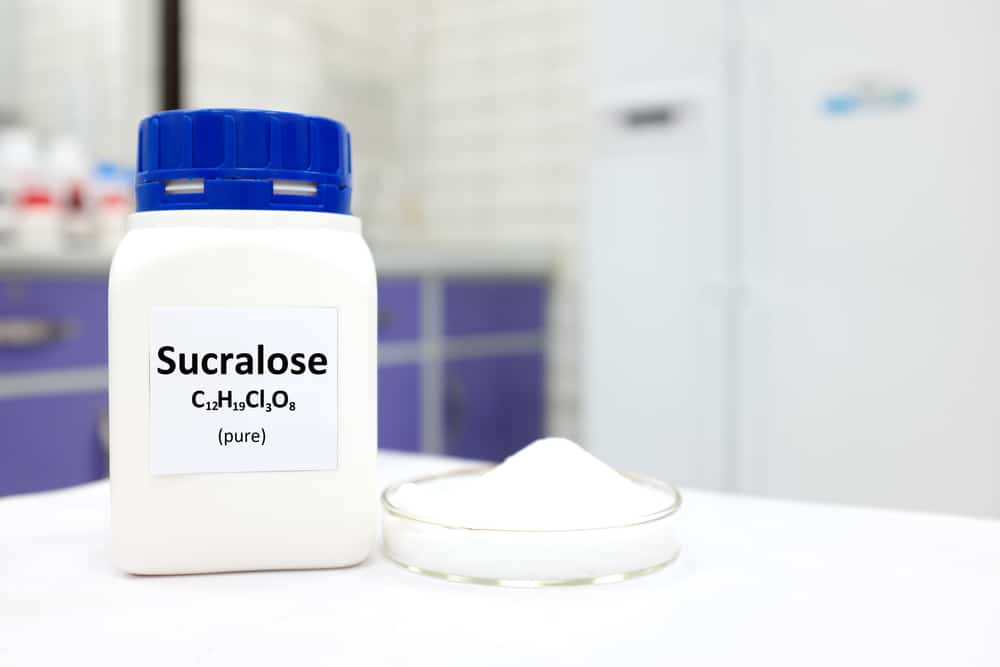Sucralose is an artificial sweetener manufacturers use in baking products and beverages. Dogs are inquisitive by nature and love to taste food products commonly found at home. However, sometimes accidental ingestion of some of these products can cause severe health-related complications. So, to keep them safe, it’s important to know which products are safe and which aren’t. With that in mind, is sucralose safe for dogs?
Sucralose is safe for dogs. It is non-toxic, but like sugars and other sweeteners, it can cause mild to moderate gastrointestinal disturbance in dogs. As always, please consult with your vet before making any changes to your dog’s diet.
Table of Contents
What Is Sucralose?

Sucralose is an artificial sweetener. Manufacturers use it as a substitute for sugar. Sucralose is made by extraction from refined sugar, a process that involves the chlorination of sucrose and selectively replacing three hydroxyl groups, thus changing its chemical nature. The name ‘sucralose’ comes from sucrose sugar.
Sucralose, sold under the brand name Splenda is 500 times sweeter than standard sugar. However, because the body can’t break it down well, it has a low caloric content per gram when compared to sugar. This makes it a popular choice for people who don’t want to gain weight and are diabetic.
In What Products Does Sucralose Appear?
Sucralose is commonly used in food products and beverages because of its low caloric content, safety for diabetics, and low incidence of dental cavities.
Also, sucralose is used as a replacement or additive along with other artificial sweeteners like aspartame or high-fructose corn syrup. It is most commonly used in candies, chewing gums, frozen dairy desserts, soft drinks, and baking products.
Is Sucralose Toxic For Dogs?
As far as sucralose is concerned, sucralose itself is relatively safe compared to other artificial sweeteners and has no risk of causing toxicity in dogs.
However, if ingested in large amounts, it can cause gastrointestinal upset, and dogs may start to show signs of gastritis, like vomiting and diarrhea. Moreover, sugars and artificial sweeteners should always be avoided in pet diets because dogs can’t process sugars as efficiently as humans do.
Why Are Sugars And Artificial Sweeteners Not Good For Dogs?
Sugars and artificial sweeteners should not be a part of a dog’s regular diet because, if ingested in large amounts, they can disturb gastrointestinal function, disrupt normal metabolism, and can increase blood sugar. Below are common issues that arise from including sugar in a dog’s diet.
Gastrointestinal Issues
Indigestion, blotting, diarrhea, and vomiting can occur if dogs ingest sugars in large amounts. Moreover, these issues arise when the digestive system fails to fully digest or absorb sugars.
Metabolic Disturbances
Long-term feeding of sugar products can result in the disturbance of metabolic pathways leading to high blood sugar, pancreatitis (inflammation of the pancreas), liver disease, diabetes, increased thirst (polydipsia), obesity, and heart diseases.
Dental Cavities And Gum Issues
Lastly, tooth decay, tartar, and periodontitis (inflammation and infection of the gums) can even lead to bleeding gums and loss of teeth in advanced stages.
Which Artificial Sweetener Is Not Safe For Dogs?
Generally, no artificial sweetener or sugar should be fed to dogs other than some natural fruits like watermelon, etc. These fruits have sugars in moderate amounts, along with fiber and water to help absorb sugars.
However, there are certain types of artificial sweeteners that are actually quite toxic for dogs and pose a serious health risk if ingested, even in smaller amounts.
Xylitol
Xylitol is a sugar alcohol, a natural sweetener found in small amounts in plants, fruits, and some vegetables. Manufacturers can make this artificially and use it as a low-calorie substitute for sugar.
This sweetener is toxic for dogs and is in sugar-free gums, candies, toothpastes, and juices.
Also, xylitol can cause a rapid insulin release in dogs, leading to hypoglycemia (low blood sugar). Toxic doses of 75 to 100 mg per kg have been reported to initiate hypoglycemia in dogs.
What Are The Signs Of Xylitol Toxicity In Dogs?
On absorption, xylitol causes a dose-dependent release of insulin that takes up all the blood sugar and causes hypoglycemia (a low blood sugar).
Signs of toxicity start to appear within just 30 minutes of ingestion. The following are the signs of xylitol toxicosis in dogs:
- Vomiting
- Ataxia (lack of coordination)
- Seizures
- Subnormal temperature
- Depression and coma
- Icterus (jaundice)
Conclusion: Is Sucralose Safe For Dogs?
In conclusion, dogs fed on sugars and artificial sweeteners can have a range of health issues, from gastric disturbances to metabolic issues like diabetes, obesity, and tooth decay. Therefore, dogs should avoid any form of sugar in their diets.
Sucralose is one of those artificial sweeteners that are relatively safe for dogs but can still cause gastrointestinal disturbance and, therefore, should also be avoided. Dogs can be fed some natural sugars from fresh fruits like watermelon, though.
So, what’s your reason for seeing if sucralose is safe for dogs? Do you plan to use alternatives now? Let us know in the comments below!
